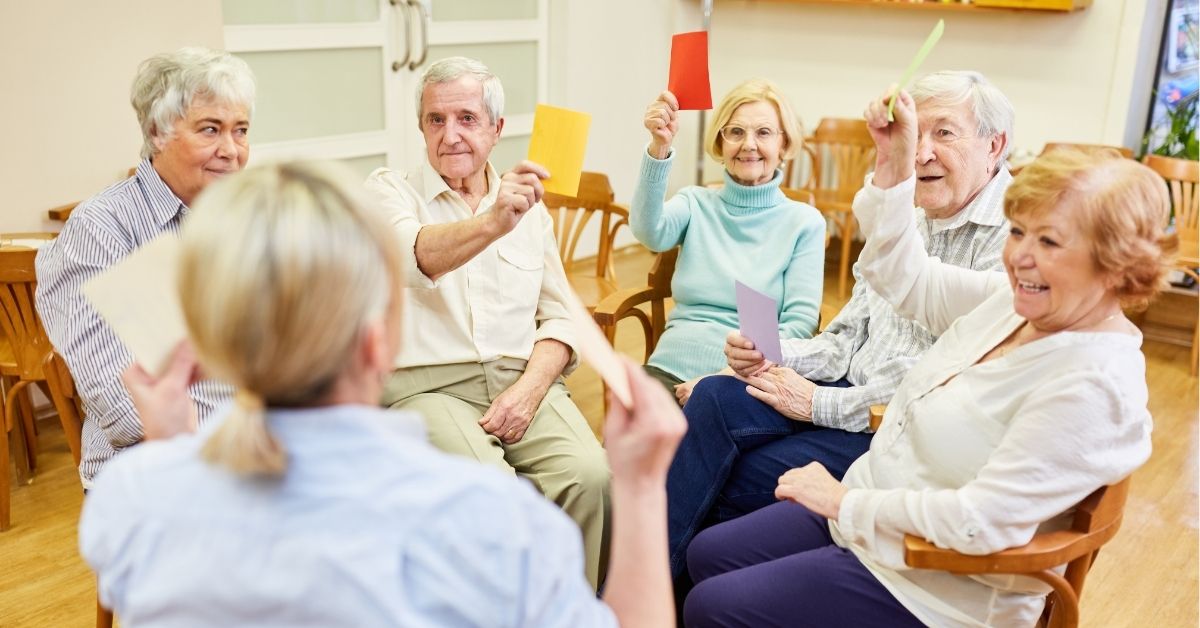
Your loved ones in memory care in Monona, WI, need effective ways to maintain their cognitive function as they age. Brain games help seniors retain their mental health effectively. Adults over 50 who work on number puzzles regularly have a cognitive performance that can match someone eight years younger when they solve these puzzles more than once a day.
Simple memory exercises and group activities are the foundations of maintaining cognitive function. These approaches can enhance quality of life and improve brain function.
What are Cognitive Exercises?
Cognitive exercises help improve or maintain cognitive function. They are “mental workouts” that boost thinking, concentration and memory.
These exercises do more than just entertain – they target specific mental skills. They differ from cognitive training (which uses standardized tasks) and cognitive rehabilitation (which focuses on personal goals) because they provide broader mental stimulation in social settings.
Why they matter in memory care settings
Cognitive exercises slow down mental decline, which is beneficial for seniors in memory care. Regular mental activity can delay memory loss. These exercises strengthen brain connections and can delay cognitive decline in mild-to-moderate dementia by six months.
The benefits go beyond brain health. These activities lift spirits and help fight loneliness, which are common challenges in memory care. Seniors who participate in stimulating activities show better emotional strength and find more meaning in their daily lives.
How do they differ from general physical activity
Physical activity helps the body through better heart health, while cognitive exercises target the brain directly. Both methods support brain health in different ways. Physical exercise creates new neurons and improves blood flow to the brain, while cognitive exercises create new neural pathways through mental challenges.
The best results come from combining both types of activities. This mix helps brain health and adds variety that keeps minds fresh.
Six Top Brain-Boosting Exercises for Seniors in Memory Care
Brain-boosting exercises at memory care in Monona, WI, can substantially boost cognitive function for seniors who face memory challenges. The right mix of mental and physical activities creates a detailed approach to brain health that works on cognitive areas of all types.
1. Mind-body exercises
Physical movement combined with mindfulness creates powerful brain benefits:
- Tai chi and chair yoga: help thinking skills in people with mild cognitive decline, improve flexibility, lower stress, help people sleep better and improve blood flow.
- Aerobic activities like walking or dancing boost memory and cognitive processing while improving blood flow to the brain.
- Resistance training with light weights or bands: Strength training provides unexpected cognitive benefits beyond physical improvements, such as staying independent, handling daily activities better, thinking more clearly, solving conflicts better, processing information faster and remembering words better.
2. Brain games for seniors: puzzles, crosswords and apps
Games that challenge the mind help keep thinking sharp:
- Crossword puzzles might delay memory decline by up to 2.5 years
- Number puzzles like Sudoku help with reasoning, memory and focus
- Card-matching games boost memory and concentration
Seniors who keep doing number puzzles show thinking skills similar to those eight years younger.
3. Memory exercises for seniors: recall games and storytelling
Memory activities strengthen recall abilities:
- Grocery list exercises: remembering items before shopping
- Sequence exercises: remembering patterns or making A-Z lists in chosen topics
- Storytelling activities where residents create stories together
These exercises build short-term memory while creating meaningful social connections.
4. Group-based cognitive activities
Brain exercises in groups combine thinking benefits with human connection:
- Board games like Scrabble help with vocabulary and planning
- Group memory circles reduce anxiety and depression
- Trivia games about familiar decades start conversations and bring back memories
5. Rhythm and music-based memory care activities
Music awakens memories even in advanced dementia:
- Personal playlists trigger emotional responses and deep memories
- Rhythm activities and drumming circles create shared experiences
- Group singing helps thinking skills, life quality and overall wellness
6. Art and creativity sessions for brain stimulation
Creative activities provide powerful cognitive benefits:
- Painting, collaging and crafts improve hand coordination
- Ceramic activities help people feel more capable and interested in life
- Art creation lets people express themselves when words become difficult
Participating in arts substantially reduces cognitive decline while making life better.
Creating a Brain-Healthy Routine
Brain health through cognitive exercises is the lifeblood of quality memory care in Monona, WI. Seniors get the most from brain exercises when they match their abilities and interests. The right balance between enjoyment and challenge helps them stay involved.
Simple number puzzles, gentle movement activities and creative expression strengthen different cognitive pathways.
Memory challenges can feel overwhelming, but you don’t have to face this trip alone. Heritage Monona’s core team understands each resident’s unique needs. You can see how these cognitive exercises combine smoothly with daily life. Contact us at (608) 441-9990 to schedule a tour today.
FAQs
Q1. What are some good brain exercises for seniors in memory care?
There are quite a few great options! Mind-body exercises are excellent because they combine movement with mindfulness. Brain games—like crosswords, puzzles or memory-matching—are also helpful. Creative things like painting, music or even storytelling sessions can also engage the brain. These exercises help stimulate different brain parts and may even help slow cognitive decline.
Q2. Do brain games actually help improve memory or thinking skills?
They really can! Seniors who regularly play brain games—like crosswords, Sudoku or memory challenges—often perform better on cognitive tests. In fact, people who frequently do number puzzles have brain function similar to someone eight years younger. The key is consistency and variety—keeping the brain challenged in fun, engaging ways.
Q3. Why are group activities important for people in memory care?
Group activities offer more than just fun—they provide mental stimulation and social connection. Group memory games, collaborative storytelling or board games help keep the brain active while encouraging interaction. This can lift mood, reduce feelings of isolation and build a sense of community, vital for emotional well-being in memory care settings.


